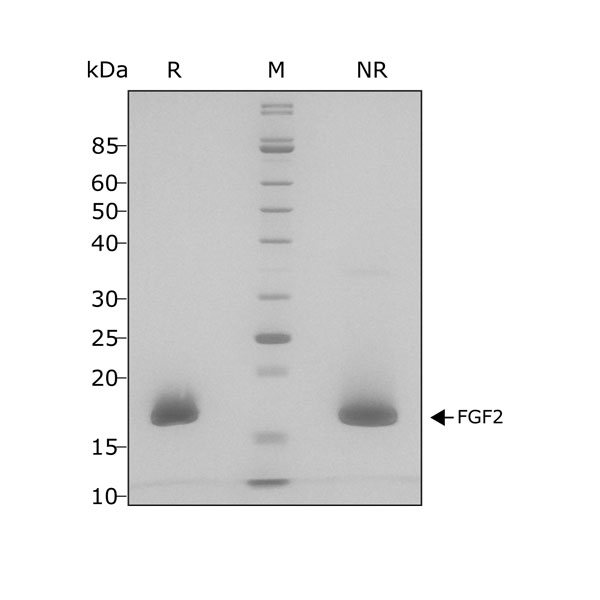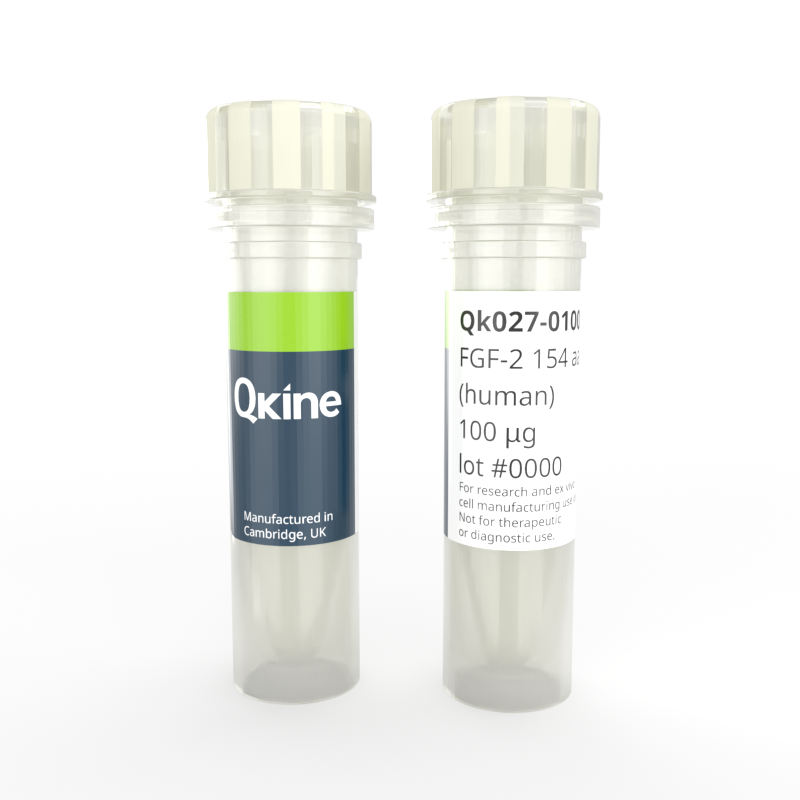 Recombinant human FGF-2 (154 aa) protein (Qk027)
Recombinant human FGF-2 (154 aa) protein (Qk027)Recombinant human FGF-2 (154 aa) protein (Qk027)
Price range: £135.00 through £670.00
Recombinant human fibroblast growth factor 2 (FGF-2) protein (154 aa) is a highly bioactive, long–form of FGF-2/bFGF protein. FGF-2 protein is used to support the maintenance of human embryonic stem cells and proliferation and differentiation of induced pluripotent and mesenchymal stem cells. This 154 aa form of FGF-2 comprises the core structured region and N-terminal extension.
Highly pure and bioactive 17 kDa FGF-2 / bFGF protein, animal origin-free (AOF) and carrier protein-free (CF).
In stock
Orders are typically shipped same or next day (except Friday).
Easy world-wide ordering, direct or through our distributors.
Price range: £135.00 through £670.00
Buy online with secure credit card or purchase order. For any questions, please email orders@qkine.com
Summary:
- High purity human FGF-2 protein comprising longer structured 154 aa region, residues 135-288 (Uniprot: P09038)
- 17 kDa
>98%, by SDS-PAGE quantitative densitometry
Expressed in E. coli
Animal origin-free (AOF) and carrier protein-free
Manufactured in our Cambridge, UK laboratories
Lyophilized from Tris, NaCl, CyS, mannitol
- Resuspend in sterile-filtered water at >50 µg/ml, add carrier protein if desired, prepare single use aliquots and store frozen at -20 °C (short-term) or -80 °C (long-term).
Featured applications:
Induced pluripotent and embryonic stem cell differentiation and maintenance

FGF-2 154 aa activity was determined using the Promega serum response element luciferase reporter assay (*) in transfected HEK293T cells. Cells were treated in triplicate with a serial dilution of FGF-2 for 6 hours. Firefly luciferase activity was measured and normalized to the control Renilla luciferase activity. Data from Qk027 lot #204659. EC50 = 282 pg/ml (17 pM).
FGF-2 migrates as major band at 17 kDa in non-reducing conditions and upon reduction. Purified recombinant protein (7 µg) was resolved using 15% w/v SDS-PAGE in reduced (+β-mercaptothanol, R) and non-reduced conditions (NR) and stained with Coomassie Brilliant Blue R250. Data from Qk027 lot #010.

Further quality assays
Mass spectrometry: single species with expected mass
Recovery from stock vial: >95%
Endotoxin: <0.005 EU/μg protein (below level of detection)
We are a company founded and run by scientists to provide a service and support innovation in stem cell biology and regenerative medicine. All our products are exceptionally high purity, with complete characterisation and bioactivity analysis on every lot.
Protein background
Fibroblast growth factors (FGFs) are a family of growth factors which regulate a wide range of essential biological functions including cell proliferation and survival, migration and differentiation [1]. The human FGF family has 18-22 members grouped into 6-7 subfamilies based on sequence homology and phylogeny [2]. The FGF family of growth factors have critical roles during both vertebrate and invertebrate embryonic development, in adult cells they modulate tissue maintenance, wound healing and angiogenesis [1,2].
The FGF ligands bind to 4 receptors (FGFR1-4), transmembrane receptors with intracellular tyrosine kinase activity [2, 3]. Once activated FGFRs recruit Src homology-2 (SH2) or phosphotyrosine binding (PTB) domain-containing signaling proteins leading to activation of intracellular signaling pathways [1]. The main signaling pathways activated by FGF binding are the RAS/MAP kinase pathway, PI3 kinase/Akt pathway, and PLCγ pathways [1-3].
Fibroblast growth factor 2 (FGF-2) also known as basic fibroblast growth factor (bFGF) has a broad range of physiological roles including regulation of cell growth, survival and proliferation. FGF-2 is one of the FGFs which binds to and signals through all four of the FGFRs [4].
FGF-2 is an essential growth factor for the maintenance of pluripotency in human embryonic stem cells (ESCs), induced pluripotent stem cells (iPSCs) [4] and mesenchymal stem cells (MSCs) [5]. FGF-2 preserves pluripotency through interaction with PI3 kinase/Akt, ERK1/2, JAK/STAT and PLCγ pathways by activation of Activin A. In feeder culture systems FGF-2 stimulates production of essential growth factors and cytokines from the feeder layer [5].
FGF-2 and TGF-β1 are required for maintenance of iPSC in feeder free culture, Qkine produces high quality, bioactive and animal origin-free FGF-2 (Qk027) and TGF-β1 (Qk010) for stem cell culture. However, FGF-2 has poor thermostability in culture so, to prevent the need for daily media changes, Qkine FGF2-G3 has been engineered to be highly thermostable allowing weekend-free culture of iPSCs.
Additional resources
- Technote | FGF2-G3 (Qk053) stability
- Differentiation of induced pluripotent stem cells (iPSCs) into neuroectoderm (PDF)
- Differentiation of induced pluripotent stem cells (iPSCs) into mesoderm (PDF)
- Poster: Neural and glial cell maintenance and differentiation
- Poster: Pluripotent stem-cell derived organoids
- Poster: Adult stem-cell derived organoids
- Brochure: Growth factors for neural and glial cell differentiation
- Brochure: Growth factors for enhanced organoid culture protocols
Publications using Recombinant human FGF-2 (154 aa) protein (Qk027)
-
Generation of functional hepatocytes by forward programming with nuclear receptors
Tomaz RA, Zacharis ED, Bachinger F et al.
DOI: doi: 10.7554/eLife.71591 -
Progesterone Receptor Modulates Extraembryonic Mesoderm and Cardiac progenitor Specification during Mouse Gastrulation
Drozd AM, Mariani L, Guo X, Goitea V, Menezes NA and Ferretti E.
DOI: doi: 10.3390/ijms231810307 -
Refined and benchmarked homemade media for cost-effective, weekend-free human pluripotent stem cell culture
Truszkowski L, Bottini S, Bianchi S et al.
DOI: doi.org/10.12688/openreseurope.18245.2 -
Single Cell Transcriptional Perturbome in Pluripotent Stem Cell Models
Balmas E, Ratto ML, Snijders KE et al.
DOI: http://dx.doi.org/10.2139/ssrn.4854180 -
Stem cell-derived porcine macrophages as a new platform for studying host-pathogen interactions
Meek S, Watson T, Eory L et al.
DOI: doi: 10.1186/s12915-021-01217-8 -
Synchronous 3D patterning of diverse CNS progenitors generates motor neurons of broad axial identity
Buchner F, Dokuzluoglu Z, Thomas J et al.
DOI: https://doi.org/10.1101/2024.12.13.628384 -
The effects of culture conditions on cell metabolism and function
Tan, J.
DOI: Thesis -
A conserved differentiation program facilitates inhibitory neuron production in the developing mouse and human cerebellum
Christensen JB, Donovan APA, Marzieh Moradi M et al.
DOI: doi.org/10.1101/2025.04.10.648162 -
LRRC58 defines an E3 ubiquitin ligase complex sensitive to cysteine abundance
Ramage DE, Wieske LHE, Crowe C at al.
DOI: doi.org/10.1101/2025.09.23.678073
FAQ
Fibroblast growth factor 2 (FGF-2), also known as basic fibroblast growth factor (bFGF) is a growth factor and signaling protein.
FGF-2 is expressed in a developmental and tissue specific manner. It’s expression is tightly controlled in normal tissues and it can be detected in all major tissues.
FGF-2 is essential for normal embryonic development. It has roles in cell survival and proliferation, angiogenesis, tumorigenesis, wound healing and tissue repair.
FGF-2 binds to and signals though all four of the FGF receptors FGFR1-4.
FGFRs phosphorylate specific tyrosine residues and activate the RAS-MAPK, PI3K-AKT, PLCγ, and STAT intracellular signaling pathways.
FGF-2 is used to maintain the pluripotency of stem cells in culture.
Our products are for research use only and not for diagnostic or therapeutic use. Products are not for resale.
For use in manufacturing of cellular or gene therapy products. Not intended for in vivo applications.

Receive an Amazon gift voucher when you leave us a review.
£25, $30 or €30 for reviews with an image and £10, $15 or €15 for reviews without an image
